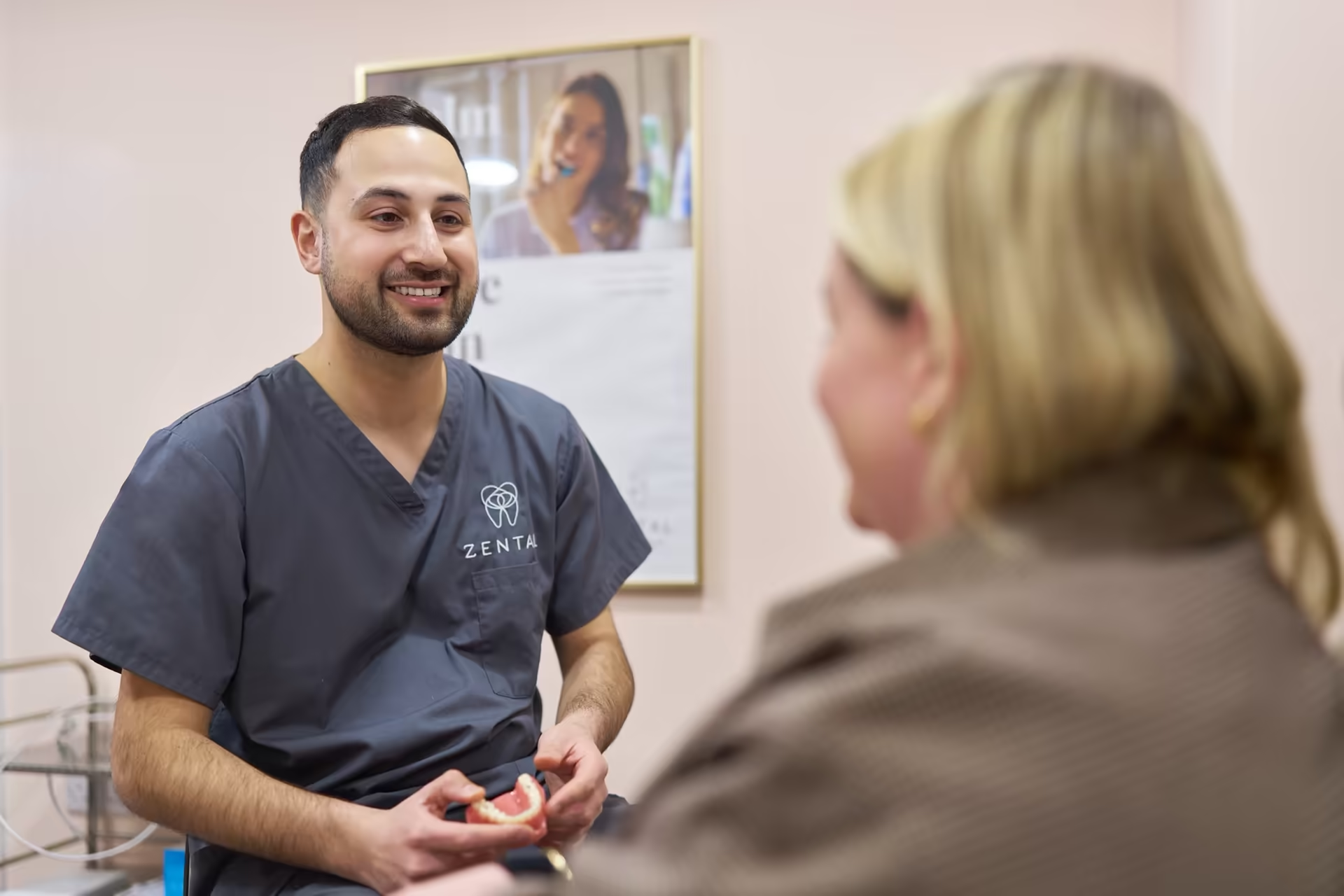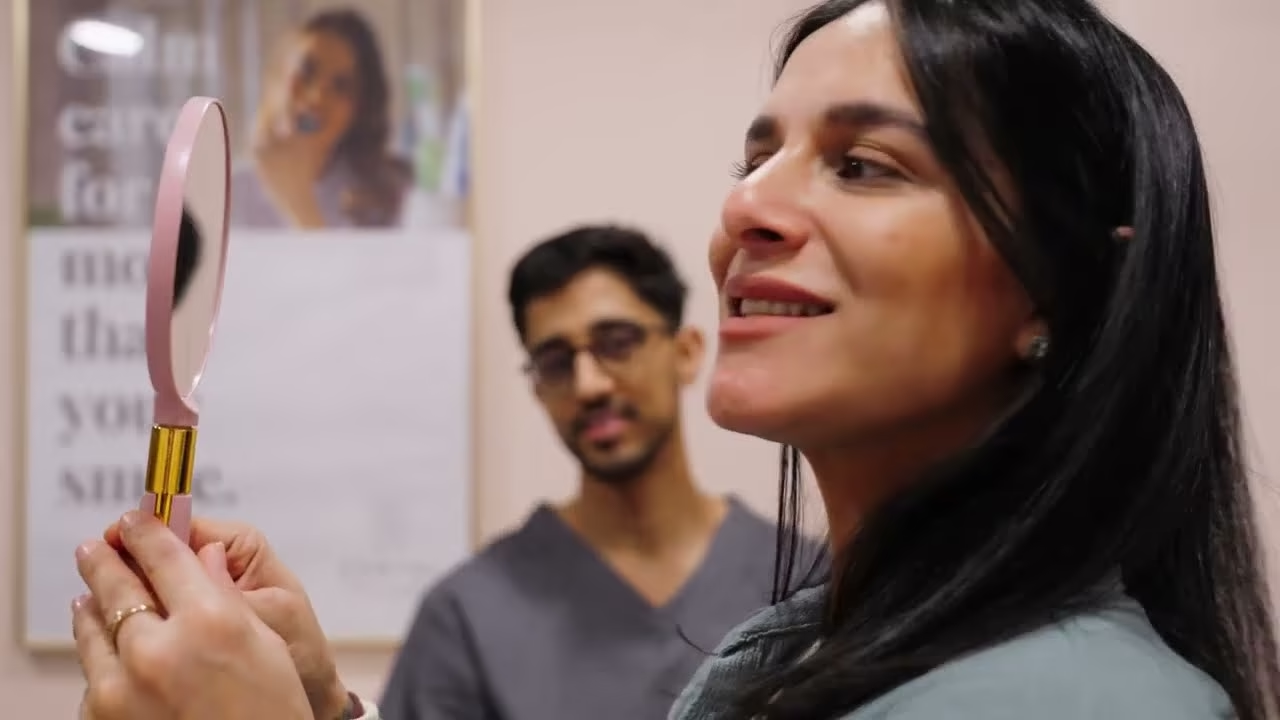

Expert Gum Disease Treatment & Prevention
Detect early gum disease that can causes tooth loss
and linked to heart disease, Alzheimer’s and diabetes.
Gum disease is the most common cause of tooth loss worldwide. It is often a completely painless disease and can easily go undetected. The latest research shows distinct links between gum disease and various other medical conditions such as heart disease, alzeimers and diabetes to name a few. Please book now to get your gums checked and if necessary treated early before it is too late.
Prices from £
98.00
Join the thousands of patients who recommend Zental
We are dedicated to providing exceptional dental care in a tranquil environment. Renowned for our outstanding service, we have helped thousands of patients transform their smiles. Experience the Zental difference and discover a new standard in dental care. Our patient reviews speak for themselves!
Before & After
No items found.
The facts about Gum Disease
Gum disease is a very common chronic condition that effects almost 1 in 2 persons in the UK to varying degrees. It is the most common cause of tooth loss in the UK and worldwide. Gum disease can be avoided by attending regular dental check ups and receiving regular dental care.
What is Gum Disease?
Gum disease, also known as periodontal disease, is a common oral health condition caused by the build-up of plaque and harmful bacteria around the teeth and gums. Gum disease begins with a sticky film of dental plaque that forms on teeth and gums, which, if not removed, can lead to inflammation and infection. Plaque buildup and hardened plaque (tartar) contribute significantly to periodontal disease and are difficult to remove without professional help.
In its early stage, known as gingivitis, which represents the early stages and is a reversible form of gum disease, patients may notice red, swollen, or bleeding gums. Common symptoms also include receding gums and inflamed gums. If left untreated, gum disease can progress into periodontitis, an advanced form of gum disease. The stages of gum disease range from the early stages of gingivitis to more severe forms like periodontitis, making early detection crucial to prevent further damage and tooth loss.
Beyond the mouth, gum disease has been linked to wider health concerns such as heart disease, diabetes, and low-grade systemic inflammation. The immune system plays a key role in the body’s response to gum infection, and a weakened immune system can increase susceptibility to periodontal disease. There is also a recognised link between gum disease and systemic conditions such as rheumatoid arthritis. This makes treating gum disease not only essential for a healthy smile but also important for your overall wellbeing.
Causes and Risk Factors of Gum Disease
While poor oral hygiene is the leading cause of periodontal disease, several other risk factors can increase your chances of developing gum problems. Smoking, genetics, diabetes, and certain medications can all make gums more vulnerable to infection. Hormonal changes, such as those occurring during pregnancy or menopause, can also heighten sensitivity to gum problems. Additionally, poor nutrition and a weakened immune system can compromise your body’s ability to fight off the bacteria that cause gum disease.
To prevent periodontal disease, it’s essential to maintain good oral hygiene by brushing and flossing daily and scheduling regular dental checkups with a dental hygienist or dentist. Early detection during the initial stages of gum disease allows for prompt intervention, see a dentist and reduce the risk of advanced gum disease and its complications. By understanding and managing these risk factors and having periodontal disease treated early, you can protect your gums and overall oral health.
Signs and Gum Disease Symptoms
Spotting the early signs of periodontal disease is crucial for protecting your teeth, gums, and overall health. Gum disease often begins quietly, but as it progresses, the symptoms become more noticeable and can have a significant impact if left untreated. See below an. example of gum disease and plaque build up before and after intensive treatment at Zental.

Stages of Gum Disease
Gum disease progresses through several stages, each with its own set of symptoms and risks. The earliest stage, known as gingivitis, is marked by inflamed gums, bleeding gums during brushing or flossing, and persistent bad breath. At this point, the condition is still reversible with improved oral hygiene and professional care. If left untreated, gingivitis can advance to periodontitis, a more severe form of gum disease. In periodontitis, the infection spreads below the gum line, causing the gums to pull away from the teeth, forming pockets that can harbor more bacteria. This stage can result in loose teeth, bone loss, and eventually tooth loss if not addressed.
Advanced periodontitis is characterised by significant bone loss, deep periodontal pockets, and severe gum recession. At this point, the supporting bone and soft tissues are extensively damaged, and teeth may become unstable or fall out. Early detection and intervention by a dental professional are crucial at every stage. A personalised, periodontal treatment plan can help halt the progression of gum disease, restore healthy gums, and prevent further complications.
Importance of Gum Health and Its Link to Overall Health
Maintaining healthy gums is about more than just a beautiful smile—it’s a vital part of your overall health. Research has shown that gum disease is linked to a higher risk of systemic conditions such as heart disease, diabetes, dementia and rheumatoid arthritis. The bacteria responsible for gum disease can enter the bloodstream, contributing to inflammation and potentially affecting organs throughout the body. Gum disease has also been associated with an increased risk of stroke and respiratory illnesses.
Practicing proper oral hygiene and scheduling regular dental checkups are essential steps to prevent gum disease and protect your overall wellbeing. Good oral hygiene habits, such as brushing and flossing daily, not only keep your gums healthy but also help reduce the risk of developing serious health conditions. By prioritising gum health, you are investing in both your oral and general health for the long term.
Gum Disease Treatment Benefits
Choosing professional treatment for gum disease offers numerous health and lifestyle benefits. Regular management with a dental hygienist or periodontist can:
- Prevent tooth loss – Early periodontal treatment strengthens gums and bone, reducing the risk of teeth becoming loose and helps preserve the supporting bone around teeth.
- Improve gum health – Professional cleaning reduces inflammation, bleeding, and tenderness.
- Freshen breath – By removing bacteria and debris, treatment addresses one of the most common causes of persistent bad breath.
- Enhance smile aesthetics – Healthier gums contribute to a brighter, more attractive smile.
- Support overall wellbeing – Reducing gum inflammation can lower risks associated with systemic health conditions.
- Long-term cost savings – Preventative gum care is far less costly than complex restorative treatments required once gum disease has advanced.
Achieving successful periodontal treatment is essential for maintaining long-term gum health and preventing recurrence of periodontal issues.
At Zental, we believe that periodontal treatment is not just about saving teeth—it is about protecting confidence, comfort, and quality of life. Our dental professionals offer a range of periodontal treatment options and will guide you in choosing the best approach for your individual needs.
Gum Disease Treatment Process
The treatment process for periodontal disease depends on the stage of the condition, but prevention and early intervention are always key. At Zental, your journey typically involves the following steps:
- Comprehensive Assessment – Our clinicians examine your gums, measure periodontal pockets, and take digital scans to determine the extent of the disease.
- Professional Hygiene Therapy – Regular scale and polish treatments remove plaque and tartar from above and below the gum line. For deeper cleaning, we may recommend Airflow therapy, a gentle yet highly effective method for stain and plaque removal.
- Deep Cleaning (Scaling & Root Planing) – In cases of periodontitis, a deep clean known as scaling and root planing removes bacteria from beneath the gums and smooths the tooth roots, helping gums reattach.
- Personalised Home Care Advice – Our hygienists provide tailored guidance on brushing, flossing, interdental cleaning, and diet to maintain healthy gums between visits. We emphasise the importance of proper brushing technique, brushing twice a day, and using antibacterial mouthwash to prevent plaque buildup and gum inflammation.
- Advanced Periodontal Care – For severe periodontal disease, our periodontists may recommend surgical procedures, regenerative procedures, or laser treatment to restore gum and bone health. These advanced therapies may include guided tissue regeneration, bone grafting, and other regenerative procedures to promote tissue regeneration and healing of lost gum tissue and soft tissue.
With regular visits, professional care, and consistent home maintenance, periodontal disease can be effectively controlled, allowing you to maintain strong teeth and healthy gums for life.
At Zental, we combine cutting-edge technology with a calm, patient-centred approach, making gum disease treatment both effective and comfortable. We utilise advanced techniques, including state-of-the-art laser technology, in the diagnosis and treatment of periodontal disease. Whether you are noticing early symptoms or dealing with more advanced concerns, our team can help you restore gum health and protect your smile.
Book a consultation online or find your nearest practice.
Testimonials
"
Safina had a serious accident many years ago. Sadly, her experience was traumatic and impacted her self confidence. She visited Zental and met with the highly skilled and dedicated team of Mr Ihsaan Al-Hadad. Her journey with Zental led her to have dental implant treatment. Safina shares her brave story and explains why she continues to Trust in Calm with Zental.
Safina's Story
"
Helen had a personal, traumatic experience that altered her confidence and wellbeing. As a consequence, she became fearful of visiting the dentist. She eventually found the courage to visit Zental Dental when she needed an emergency dentist. Helen shares her brave story and explains why she continues to Trust in Calm with Zental.
Helen's Story
"
Marianne had a bad experience with her dentist at a young age. Sadly, this altered her relationship with the dentist during adulthood. She decided to visit Zental and undergo comprehensive treatment. Marianne shares her brave story and explains why she continues to Trust in Calm with Zental..
Marianne's Story
What our patients ask about Gum Disease
Got one more? Contact us now or book in for a consultation and and we will be happy to assist.
Q
What is Gingivitis?
Gingivitis is where your gums become inflamed due to the presence of bacteria (plaque) that accumulates near to it. This inflammation is typically characterised by a ‘fiery red appearance’ bleeding and swelling of the gums to varying degrees and occasional discomfort but rarely pain. In the presence of gingivitis the bone supporting the teeth is fully intact.
Once the bacteria around the teeth and gums is removed thoroughly the inflammation, swelling and bleeding should subside and the gums should return back to full health hence the reversible nature of this disease.
Q
What is Periodontitis?
Periodontitis is characterised by swollen and inflamed gums similar to gingivitis. However the main feature of this condition is that the bone supporting the teeth erodes over time. Additionally it also has typical features of loose teeth, receded gums, a ‘long in the tooth appearance’, bad breath, drifting of teeth and an increase in the gaps between the teeth. It can also result in regular gum infections and eventual loss of the teeth.
Q
How common is gum disease?
According to the European Federation of Periodontology, 80% of adults over the age of 35 are impacted by gum disease in some capacity. Some level of irreversible periodontitis affects almost 50% of the UK population, although this might underestimate true disease levels.
Similar levels of periodontal diseases are present globally, with the latest evidence suggesting that around 10% of the world’s population (8.2 to 11.4% age standardised) has evidence of severe disease. The peak in prevalence occurs between 60 and 64 years of age, and there are marked inequalities by socio-economic status. About half of all adults have some evidence of moderate disease and thus, it is one of the most common chronic inflammatory diseases globally.
Q
Is gum disease a painful condition?
Both Gingivitis and Periodontitis are typically painless and therefore can impart a false sense of security where most people may not even know they have it.
Q
Can gum disease be cured?
Gingivitis alone (where there is no bone loss around the teeth) can be treated by removing the plaque and bacterial deposits around the teeth and gums and they should return back to health.
Periodontitis (where you have had bone loss around the teeth) unfortunately cannot be cured but can be ‘controlled’. By getting the right treatment promptly and controlling the risk factors we can bring the gums back to health again and stabilise the disease process. This would ensure the teeth would survive longer. Any bone you have already lost up until that point will unfortunately not regenerate and so the sooner this disease is noticed and treated the longer you will hold onto your teeth.
Q
How do you detect for gum disease?
At every dental check-up the dentist will always do a general gum screening assessment to give us an overview of the general health of the gums. The presence or fiery red, swollen and bleeding gums in the presence of plaque indicate gingivitis whilst the presence of ‘deep pocketing’ and bone loss on an x-ray is indicative of periodontitis.
If the general gum assessment reveals a problem then depending on the severity a separate appointment may be required to carry out a more comprehensive gum assessment where the severity of the disease is accurately mapped out so it can be treated more effectively with a targeted approach
Q
What is gum pocketing?
A healthy gum is usually attached tightly to the tooth surface with very little gap between the tooth and the gum and no bleeding present. This gap known as a ‘pocket’ is 3mm or less in the healthy state which is usually very easy to keep clean with oral hygiene measures. When gum disease takes hold the gum detaches from the tooth surface and swells. This creates a much larger depth of pocket in between the tooth and gum making cleaning via a normal tooth brush much more difficult. If you have deep gum pockets (>4mm) in the presence of bone loss then you have irreversible gum disease (periodontitis). This must be treated swiftly to prevent the loss of the tooth.
Q
How do I know if I have gum disease?
You must visit your dentist for regular check ups and they will advise on whether you have gum disease and if so to what degree. You will also be advised on preventive strategies to keep the gums healthy for the long term. Some tell tale signs to look out for include: bleeding gums, sore gums, bad breath, gum boils, loose teeth
Q
How is gum disease treated?
Gingivitis is treated by professional cleaning with a dentist or hygienist either with or without local anaesthetic to remove the plaque and calculus deposits that have accumulated in the mouth. The dentist/hygienist will then instruct the patient on the most effective oral hygiene measures and then it is down to the patient to ensure an exceptional level of oral is maintained until the next cleaning session to ensure the gingivitis resolves.
Periodontitis is also treated by professional deep cleaning under local anaesthetic to remove all the plaque, bacteria, calculus and diseased tissue in all the deep pockets present in the mouth. This is known as ‘non-surgical’ gum treatment and usually done over 4-5 visits if the whole mouth is affected.
In certain cases gum surgery may be required to eliminate ‘stubborn pockets’
Q
What are the side effects of the treatment of Periodontal disease?
The common side effects are: a temporary increase in sensitivity, recession of your gums as they shrink and become less swollen following successful treatment, longer looking teeth as the gums recede and an increase in the spaces in between your teeth. Once the gums are stable any cosmetic issues can be managed with cosmetic dental treatment where required.
Q
Can the disease return once my gums are stable?
Gum disease can always return if any of the risk factors mentioned above return or become more prevalent.
Q
How often would you recommend seeing the hygienist for cleaning if I only have gingivitis?
Every 3 months would be the ideal
Q
What will determine whether my gums deteriorate in future after they have been treated?
The same factors that determined why you got the disease in the first place – namely genetic pre-disposition, the effectiveness of your oral hygiene measures, how frequently you attend for dental check ups and hygiene visits, how much you care for the health of your own gums, how well you follow professional advice, whether you smoke, your general health status, the level of immunity, if you are diabetic then how well controlled your immunity is amongst other factors.
Q
Are there any medical conditions that pre-dispose me to gum disease?
Diabetes has the most well established link to gum disease. The more poorly controlled the diabetes the severe the gum disease will be. Any other conditions that reduces ones immunity can contribute to the severity of the gum disease process
Meet the experts who will treat you

Dr Svetislav Zaric
Specialist Periodontist (Gum Expert)
BDS (Hons), MSc, PhD (Belfast), FHEA, M Perio RCS(Ed)

Dr Svetislav Zaric
Specialist Periodontist (Gum Expert)
BDS (Hons), MSc, PhD (Belfast), FHEA, M Perio RCS(Ed)


Dr Svetislav Zaric
Specialist Periodontist (Gum Expert)
BDS (Hons), MSc, PhD (Belfast), FHEA, M Perio RCS(Ed)
Sveta graduated in 2003 from the prestigious School of Dentistry, University of Belgrade before undergoing his Master of Sciences in Periodontal Therapy and Oral Medicine. The research for his Doctor of Philosophy was undergone at Queens University Belfast on Mechanisms of Immunomodulation for treatment of periodontitis. He is currently a Clinical Lecturer and an Honorary Consultant in Periodontology in King’s College London Dental School and Guy’s and St Thomas’s NHS Foundation Trust.
Sveta enjoys teaching, which particularly shows in his interaction with patients and colleagues. He has held several posts including External Examiner for different Universities, Editorial Board Member of Journals, and a Supervisory role for Research students. He has written books, lectured in the UK as well as internationally and has published several articles and research in prestigious medical, dental, and surgical journals. He has attracted several grants and research awards on Periodontal disease and is considered a leading authority on this condition.
His interest in Periodontics stems from the perception that changing patients’ attitude towards oral hygiene and optimising the periodontal tissues set the foundations for achieving oral health and are vital steps before proceeding to advanced dental treatments.
Sveta’s special interests include treatment of periodontitis & peri-implantitis, surgical treatment of non-responsive periodontal defects, periodontal regeneration, soft tissue aesthetics, mucogingival defects, gum grafts, crown lengthening procedures & implant therapy.

Dr Mira Morcos
General and Cosmetic Dentist
BDS, MJDF RCS(Eng)

Dr Mira Morcos
General and Cosmetic Dentist
BDS, MJDF RCS(Eng)


Dr Mira Morcos
General and Cosmetic Dentist
BDS, MJDF RCS(Eng)
Mira has a special interest in General & Cosmetic dentistry, smile makeovers, Smilefast, teeth whitening & Invisalign.
Dr Mira Morcos completed her studies at The Royal London School of Medicine & Dentistry in 2008. Her passion for providing beautiful healthy smiles has led her to complete an array of further postgraduate training.
This has been focused on minimally invasive cosmetic dentistry, as well as endodontics (that’s root canal treatment to you and me) travelling as far as San Francisco to learn from some of the best dentists in the world.
Mira also enjoys restoring smiles with cosmetic orthodontics such as Invisalign and is always up to date with the leading technology available to use for her patients.
In addition to high quality dental care, Dr Mira’s inviting, calm and gentle nature ensures that even the most nervous of patients feel very comfortable.

Dr Nitin Joshi
General, Cosmetic and Implant Dentist
BDS, MJDF RCS (Eng)

Dr Nitin Joshi
General, Cosmetic and Implant Dentist
BDS, MJDF RCS (Eng)


Dr Nitin Joshi
General, Cosmetic and Implant Dentist
BDS, MJDF RCS (Eng)
Nitin has a special interest in general and cosmetic dentistry, root canal treatments & teeth whitening.
Nitin completed his BDS in 2004. He completed the prestigious Diploma for Membership of the Joint Faculty of the Royal College of Surgeons 2013. He is a family man who is driven by his passion for dentistry and possesses an outstanding work ethic. Nitin prides himself on being a perfectionist when it comes to implementing his technical skills. He enjoys spending time getting to know patients and their concerns in order to tailor their dental care based on individual needs and try to improve the overall patient’s experience through his calm manner.
Nitin has trained under the renowned Restorative and Cosmetic Dentist Dr Christopher Orr enabling him to treat patients with complex dental problems such as worn-down teeth and those who want an improvement in the appearance of their smile with minimally invasive dentistry. His additional interests including improving the life span of badly broken-down teeth using endodontic treatment and direct and indirect restorations as well as improving teeth alignment using different orthodontic systems like Invisalign, Quick straight teeth and C-Fast. He is an expert in digital smile design and welcomes patients with full mouth rehabilitation. Nitin is skilled at dental implant treatment and incorporates it as part of his holistic patient approach.
In his spare time, Nitin enjoys badminton and traveling the world with his wife and daughter.

Dr Alex Sabonchian
General and Cosmetic Dentist
BDS, MSc (Restorative Dental Practice)

Dr Alex Sabonchian
General and Cosmetic Dentist
BDS, MSc (Restorative Dental Practice)


Dr Alex Sabonchian
General and Cosmetic Dentist
BDS, MSc (Restorative Dental Practice)
Alex is deeply passionate about dentistry and committed to providing the highest level of care in both his treatments and patient interactions. His calm and relaxed demeanour helps to put patients at ease, while ensuring they are well-informed throughout the process.
Alex qualified from the Cardenal Herrera University in Valencia, Spain. He has also recently completed his Masters degree in Restorative Dental Practice from the Eastman Dental Institute with a distinction and is working towards a publication of his dissertation in the Lancet Medical Journal.
Alex has a passion in restorative and cosmetic dentistry, with particular interest in endodontics, Invisalign and bonded indirect restorations. Alex likes to regularly keep up to date with his training by attending numerous CPD short courses including Monik Vasants Totally Composite Course and the Aesthetic Prosthetic course by Minesh Patel and Imi Nasser.
Alex has passions outside dentistry including playing the piano and drums as well as being in nature and meditation.
Articles
No items found.
Typical procedures
There are two main procedures associated with Inman aligner treatment which allow us to be able to give you the beautiful smile that you deserve. One of them is the use of attachment technology and the other is known as IPR. More details of each are given below:
No items found.
Book your next dental appointment with us

Our dental practices provide a serene, spa-like environment designed to relax your senses while delivering advanced, high-quality care. Using state-of-the-art technology coupled with exceptional patient care, we ensure a calm, stress-free experience that leaves you feeling refreshed and confident in your smile.
Online or by phone
Book online a dentist near you, anytime day or night. Alternatively, if you wish to discuss your needs with a member of the Zental team, please do not hesitate to call us.
Alternativley let us contact you
If you prefer we make contact, at a time convenient to you, kindly provide your contact information below and a member of the Zental team will be in touch with you as soon as possible.
Thank you! Your submission has been received!
Oops! Something went wrong while submitting the form. please call 020 3982 8602 , or use our chat function









